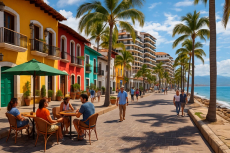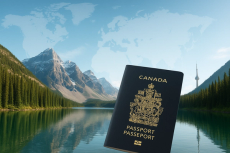Blog • Published on:October 3, 2025 | Updated on:October 3, 2025 • 15 Min
Everything You Need to Know About Moving to Hungary in 2025
In 2025, Hungary has become one of the most accessible EU countries for expats. The Hungary Golden Visa, relaunched in July 2024, allows applicants to secure a 10-year residence permit for as little as €250,000, offering visa-free access across the Schengen Area.
Beyond immigration, Hungary stands out for its affordability and quality of life. Living costs are 25% below the EU average, with monthly expenses starting from around €600 per person.
Combined with a flat 15% income tax rate, Hungary has quickly positioned itself as a competitive base for professionals, families, and retirees.
Over 250,000 foreign nationals already reside in Hungary, drawn by its location in the heart of Europe, respected universities, and a healthcare system that meets EU standards at a fraction of Western European prices.
This guide breaks down everything you need to know, from visa options and legal requirements to the best cities to live in and the path to Hungarian citizenship.
You can learn more in our Hungary Residency by Investment Program page.
Why Hungary is a Smart Move in 2025
Hungary combines EU access, affordability, and a central European base, making it one of the most appealing destinations for relocation this year.
EU Membership Benefits
As an EU and Schengen member, Hungarian residents enjoy:
- Visa-free travel across 27 EU countries and the wider Schengen Area (90 days in any 180-day period).
- Legal protections under EU law, including access to healthcare, education, and workers’ rights.
- The ability to apply for permanent residency or citizenship under EU frameworks.
Europe’s Crossroads
Hungary sits at the crossroads of Central and Eastern Europe. From Budapest, Vienna is just 2.5 hours away by train, while Prague, Bratislava, and Zagreb are also easily accessible.
Its central location makes it ideal for professionals and businesses serving multiple European markets.
Quality of Life
Hungary offers 25% lower living costs than the EU average.
- Average monthly expenses: around €600 per person (excluding rent)
- A family of four can live comfortably on about €2,500 per month.
- Flat 15% personal income tax, one of the lowest in Europe
Growing Expat Community
More than 250,000 foreign nationals currently live in Hungary. Expats are concentrated in Budapest, but also in university hubs like Debrecen and Szeged.
The community includes professionals in IT, education, healthcare, and manufacturing, as well as students and retirees.
For a breakdown of Hungary’s travel advantages, see our blog: Hungary Visa-Free Countries.
Immigration Requirements and Eligibility in Hungary
Moving to Hungary requires meeting certain legal, financial, and health criteria. While EU citizens enjoy simplified procedures, third-country nationals (non-EU/EEA) must apply for a residence permit before or shortly after arrival.
General Documentation Requirements
Applicants must typically provide:
- Valid passport (with at least 6 months’ validity)
- Completed application form
- Recent passport-size photos
- Proof of accommodation (rental contract, property deed, or hotel booking)
- Proof of sufficient funds to support living in Hungary
- Travel/health insurance for the duration of the stay
Applications are processed through Hungary’s Enter Hungary online platform, managed by the National Directorate-General for Aliens Policing (NDGAP).
Financial Requirements
Hungarian authorities require proof that you can support yourself without relying on public assistance. This can include:
- Bank statements
- Employment contract or employer guarantee
- Scholarship certificates (for students)
- Proof of investment (for business or Golden Visa applicants)
For long-term residency, monthly financial support should exceed minimum Hungarian wage levels (currently about €750 gross per month, 2025).
Health Insurance Requirements
Applicants must have valid health insurance covering treatment in Hungary. Once residence is approved, expats can register with Hungary’s National Health Insurance Fund (NEAK). Many expats also maintain private coverage for faster access to specialists.
Criminal Background Checks
All applicants from third countries must submit a criminal record certificate issued by their home country (or country of residence for the past 5 years). Hungary requires a clean record, with exceptions considered case by case.
Residence Permit Options in Hungary
Hungary offers several residence permit categories depending on your purpose of stay. Each has its own documentation and eligibility requirements.
Hungarian Investment Programs (Golden Visa)
Hungary relaunched its Golden Visa program in 2024, offering a direct route to long-term residency.
Options include:
- Investment of at least €250,000 in real estate fund units
- Donation of €1,000,000+ to a public Hungarian institution of higher education
Approved applicants first receive a Guest Investor Visa (6 months), then a 10-year renewable residence permit.
Family members can be included under the same application.
Work-Based Residence Permit
Foreigners with a job offer in Hungary can apply for a work residence permit.
Requirements include:
- Valid employment contract with a Hungarian company
- Proof of accommodation in Hungary
- Health insurance coverage
The permit is usually granted for 2 years and renewable as long as employment continues.
Student Residence Permit
Issued to non-EU students accepted into Hungarian educational institutions.
Requirements include:
- Acceptance letter from a recognised university or school
- Proof of tuition payment
- Financial means to support living costs
- Health insurance
Students are granted residency for the duration of their studies, with limited work rights.
Family Reunification Visa
Family members of Hungarian citizens or legal residents can apply to join them.
Eligible relatives include:
- Spouse or registered partner
- Minor children
- Dependent parents in some cases
Proof of relationship (marriage/birth certificates) and proof of accommodation are required.
Business Immigration to Hungary
Entrepreneurs can establish companies in Hungary and apply for residency based on their business activity.
- The most common structure is a Kft (limited liability company) with minimum capital of HUF 3,000,000 (€7,700).
- Applicants must show real business activity, not just a registered shell.
The permit is typically valid for 1 year, renewable upon proof of active business operations.
Cost of Living in Hungary (2025)
Hungary offers one of the lowest living costs in the European Union, making it attractive for students, professionals, and families alike.
Housing and Rent
- One-bedroom apartment in city centre (Budapest): ~€670 per month
- One-bedroom apartment outside centre: ~€530per month
- Three-bedroom apartment in city centre: ~€1,220 per month
- Three-bedroom apartment outside centre: ~€895 per month
Daily Expenses
- Monthly groceries (per person): ~ €150 – €250
- Restaurant meal (mid-range): ~ €50 (for 2)
- Utilities (electricity, heating, water, internet, etc.) for an average flat: ~ €115 – €205
Education Costs
- Public schools: free for residents
- International schools: €10,000–€40,000 per year
- Universities: €2,500–€16,000 per semester for non-EU students
Healthcare Expenses
- Public healthcare contribution: included in social security
- Private insurance: €25–€3000 per month, depending on coverage
Transportation Costs
- Monthly public transport pass (Budapest): ~€25
- Taxi: €3 base fare + ~€1 per km
- Petrol: ~€1.50 per litre
Best Places to Live in Hungary
Hungary offers diverse living environments, from the lively capital to quieter regional towns and lakeside retreats.
Expats can choose between bustling urban centers, academic hubs, and more relaxed lifestyle regions.
Budapest: The Cultural Capital
Budapest is Hungary’s largest city and home to the majority of the expat community. It combines historic architecture with a lively modern scene, from cafés and theaters to co-working spaces and international schools.
Housing costs are higher than elsewhere in Hungary, with city-centre rents averaging around €670 for a one-bedroom apartment and €1,220 for a three-bedroom flat. Still, Budapest remains far more affordable than other EU capitals.
Debrecen: Educational Center
Debrecen, Hungary’s second-largest city, is known for its strong academic reputation and family-friendly environment.
With several universities and research centres, it attracts both students and professionals.
The cost of living is lower than in Budapest, making it appealing for families who want access to good schools, a safe setting, and less crowded surroundings.
Szeged: Southern Charm
Szeged offers a blend of culture, relaxed living, and affordability. It is a popular destination for students due to its well-regarded university, while expats value its slower pace of life, pleasant climate, and low housing costs.
Many international residents choose Szeged as an alternative to Budapest for a quieter yet connected lifestyle.
Lake Balaton Region: Tourism Hotspot
Often referred to as the “Hungarian Sea,” Lake Balaton is Central Europe’s largest freshwater lake and a major tourist destination.
The area attracts both retirees and digital nomads who prefer a leisure-oriented lifestyle surrounded by nature.
Housing prices can vary, but seasonal rental opportunities make it attractive for those seeking flexibility.
Healthcare in Hungary
Hungary’s healthcare system is part of the European Union framework, offering residents access to public services while also supporting a growing private sector that many expats use for convenience.
Public Healthcare Access
Public healthcare is managed through the National Health Insurance Fund (NEAK).
- All employed residents contribute to the system through payroll deductions.
- EU citizens can use their European Health Insurance Card (EHIC) for temporary coverage.
- Non-EU expats with a residence permit are required to register and make contributions to access the same services.
Public hospitals and clinics cover most treatments, though waiting times can be long in larger cities.
Private Medical Insurance
Many expatriates opt for private health insurance, which ensures faster appointments and access to English-speaking doctors.
- Monthly premiums typically range between €25 and €300, depending on age and coverage.
- Private hospitals in Budapest, Debrecen, and Szeged are increasingly catering to international patients.
Emergency Services
Emergency medical services are available nationwide. The emergency phone number is 112 (EU-wide).
Ambulance response times in Budapest and major cities are fast, while rural areas may experience longer waits.
Emergency care is provided regardless of insurance status, though non-residents may be billed.
Working in Hungary
Hungary’s job market is steadily expanding, with opportunities in IT, manufacturing, healthcare, and education.
For expats, securing the right permit and understanding the market is essential before relocation.
Job Market Overview
- Hungary has one of the lowest unemployment rates in Central Europe, hovering around 4.5% in 2025.
- Key industries with labour shortages include information technology, engineering, construction, and healthcare.
- English-speaking roles are increasingly available, particularly in multinational companies based in Budapest.
Work Permit Process
Non-EU nationals must apply for a combined work and residence permit.
- Application requires a signed job contract, work permit approval from the labour authority, proof of accommodation, and health insurance.
- Permits are generally issued for 2 years and can be renewed as long as employment continues.
EU/EEA citizens do not need a work permit but must register with the local authorities if staying longer than 90 days.
Popular Industries for Foreigners
- IT and Software Development – high demand for developers, data analysts, and cybersecurity specialists
- Shared Service Centres (SSC/BPO) – Budapest hosts many multinational offices offering roles in finance, HR, and customer support.
- Healthcare – ongoing need for qualified doctors, nurses, and caregivers
- Education – English-language teachers are in demand, particularly in Budapest and major university towns.
Salary Expectations
- Average monthly net salary in Hungary: ~€1,800
- IT professionals: €2,200–€5,000 depending on seniority
- Engineers: €1,500–€2,500
- Teachers: €900–€1,400
- Healthcare professionals: €1,000–€1,600
While salaries are lower than in Western Europe, the cost of living is around 25% lower than the EU average, making Hungary attractive for expats balancing earnings with lifestyle affordability.
Education System in Hungary
Hungary’s education system combines EU standards with affordability, making it attractive for families relocating with children or for international students seeking higher education opportunities.
International Schools
Budapest hosts several international schools offering curricula in English, French, and German, alongside the International Baccalaureate (IB).
- Annual tuition ranges between €6,000 and €40,000 depending on grade level and school.
- Popular choices include the American International School of Budapest, the British International School Budapest, and the Gustave Eiffel French School of Budapest.
These schools are ideal for expat families wanting continuity in global education.
Hungarian Public Education
Public schools are free for residents and provide strong academic foundations.
- Instruction is primarily in Hungarian, which can be a challenge for non-native speakers.
- Some public schools in Budapest and larger cities offer bilingual programs, particularly in English and German.
- Schooling is compulsory between ages 6 and 16.
Higher Education Options
Hungary has several universities ranked in the QS World University Rankings.
- Leading institutions include the University of Szeged, Eötvös Loránd University, and the Budapest University of Technology and Economics.
- Tuition fees for non-EU students range from €2,500 to €16,000 per semester, with many programs available in English.
- Hungary also attracts medical students worldwide due to its recognised English-taught programs in medicine and dentistry.
Legal Procedures for Moving to Hungary
Once you’ve secured a residence permit, several administrative steps must be completed to fully register your stay in Hungary.
These procedures ensure access to healthcare, taxation systems, and social security.
Registration Requirements
All foreigners staying longer than 90 days must register with the National Directorate-General for Aliens Policing (NDGAP) through the Enter Hungary portal.
Registration confirms your legal residence and provides the official residence card.
Address Registration
Expats must declare their Hungarian residential address. This can be done using:
- A rental contract signed with a landlord
- Proof of property ownership
- An official address card (issued once the address is accepted by local authorities)
This registration is required for almost all further procedures, including banking and healthcare.
Tax Number Application
To work, study, or run a business in Hungary, you need a Hungarian Tax Identification Number (TIN) issued by the National Tax and Customs Administration (NAV).
- Applications can be made in person at NAV offices or online via Enter Hungary.
- The TIN is essential for employment contracts, tax filing, and business ownership.
Social Security Registration
Expats employed in Hungary are automatically registered in the NEAK (National Health Insurance Fund) system via payroll contributions.
- Self-employed individuals or entrepreneurs must register independently and pay contributions.
- Registration ensures access to public healthcare and eligibility for pension schemes.
Hungarian Language and Integration
Adjusting to life in Hungary is not only about paperwork, as cultural and language adaptation play a big role in how smoothly expats settle in.
Language Requirements
Hungarian (Magyar) is the official language and considered one of the more challenging European languages to learn.
- Only about 25% of the population speaks English, mainly in larger cities like Budapest.
- For long-term residence or citizenship, basic proficiency in Hungarian is required, including the ability to understand official documents and pass language tests.
Cultural Adaptation
Hungarian culture blends Central European traditions with unique national identity. Expats often highlight:
- Hospitality: Hungarians are welcoming, though initial interactions can feel formal.
- Work culture: Punctuality and formality are valued in professional settings.
- Cuisine and traditions: Food, music, and festivals play an important role in community life.
Understanding local etiquette, such as using formal greetings with titles, helps in social and business integration.
Integration Programs
Hungary offers integration support through:
- Language courses: Available at universities, cultural centres, and private schools
- Community organisations: Budapest has a growing number of expat clubs and cultural associations.
- EU-supported initiatives: Certain integration projects assist non-EU nationals in adapting to Hungarian society.
While learning Hungarian can be a hurdle, making the effort greatly improves career opportunities, social life, and eligibility for citizenship.
Pathway to Hungarian Citizenship
Residency in Hungary can eventually lead to full citizenship, but the process requires patience, consistency, and integration.
Naturalization Requirements
Foreigners can apply for Hungarian citizenship after:
- 8 years of continuous permanent residence in Hungary, or
- 3 years if married to a Hungarian citizen, or if raising a Hungarian citizen child.
During this period, applicants must demonstrate good conduct, financial self-sufficiency, and no criminal record.
Language Proficiency
Applicants must pass a Hungarian language and culture exam as part of the naturalization process. This test evaluates basic communication skills and knowledge of Hungary’s history and constitution.
Citizenship Benefits
Hungarian citizenship comes with significant advantages:
- EU Passport: visa-free travel to 175+ countries, including the USA, UK, Japan, and Singapore
- Full EU rights: live, work, and study in any EU member state
- Generational security: citizenship passes automatically to children.
- Political rights: ability to vote and participate in Hungarian and EU elections
For many expats, Hungarian citizenship provides not only stability within Hungary but also long-term integration into the wider European Union.
Banking and Financial Matters in Hungary
Setting up your finances in Hungary is a straightforward process, but it’s essential for expats to understand how banking, taxes, and currency work before moving.
Opening a Hungarian Bank Account
Expats with residence permits can open bank accounts in both local and international banks operating in Hungary.
- Documents usually required: passport, residence card, Hungarian address card, and tax number
- Major banks include OTP Bank, K&H Bank, and Erste Bank, along withbranches of European banks.
- Accounts can be opened in HUF and EUR, with debit cards issued instantly in most cases.
Tax Considerations
Hungary has one of the lowest flat personal income tax rates in the EU at 15%.
- Tax residency is determined if you spend more than 183 days per year in Hungary.
- Social security contributions apply for employees and self-employed workers.
- Corporate tax is also attractive, set at 9%, making Hungary one of the most competitive jurisdictions for businesses in Europe.
Currency and Exchange
Hungary’s official currency is the Hungarian Forint (HUF). While the country is an EU member, it has not adopted the euro.
- 1 EUR ≈ 390 HUF (2025 average).
- Most international transactions, rent agreements, and tuition payments can also be arranged in euros, particularly in Budapest.
- ATMs and card payments are widely available, though smaller towns may prefer cash transactions.
Is Moving to Hungary Right for You?
Hungary in 2025 offers a unique balance of affordability, EU access, and long-term security.
With living costs far below the European average, a competitive 15% flat income tax, and new residency pathways like the Hungary Golden Visa, the country has become a strategic choice for expats, families, and investors alike.
Making the right move requires understanding the legal framework, evaluating the best permit for your profile, and planning for long-term goals such as citizenship and wealth management.
Savory & Partners has guided thousands of families and professionals through this process, with government authorisation and over 11,000 successful approvals worldwide.
Contact us today to explore how Hungary’s residency options can align with your objectives for 2025 and beyond.
FAQs on Moving to Hungary in 2025
1. How much does it cost to live in Hungary each month?
On average, a single person spends around €600 per month, excluding rent. A family of four typically needs about €2,500, an average that can go up or down depending on lifestyle and location.
2. Can foreigners buy property in Hungary?
Yes, non-EU citizens can purchase property in Hungary, but they require approval from local authorities. Many expats choose this option as part of their residency or investment strategy.
3. How long does it take to get Hungarian residency?
Most residence permits are processed within 2–8 months, depending on the type of permit and documentation provided. The new Hungary Golden Visa offers faster-track approvals.
4. Does Hungarian residency lead to citizenship?
Yes, after 8 years of continuous permanent residency (with shorter timelines for marriage or family ties), foreigners may apply for citizenship, provided they pass the Hungarian language and culture exam.
5. Is healthcare in Hungary reliable for expats?
Yes, Hungary’s healthcare system meets EU standards. Residents can access public care through the NEAK system, while many expats choose private health insurance for faster and English-speaking services.
References
Hungarian Central Statistical Office (KSH). (n.d.). Prices and Consumer Indices. Retrieved from https://www.ksh.hu/prices
Numbeo. (n.d.). Cost of Living in Hungary. Retrieved from https://www.numbeo.com/cost-of-living/country_result.jsp?country=Hungary
Hungary Government. (n.d.). Enter Hungary – Residence in Hungary. Retrieved from https://enterhungary.gov.hu
OIF – Office of Immigration and Nationality, Hungary. (n.d.). Temporary Residence Permit Fact Sheet. Retrieved from https://oif.gov.hu/factsheets/temporary-residence-permit
Written By

Alice Emmanuel
Alice Emmanuel is an expert in residency and citizenship by investment, specializing in government compliance and program optimization. With over 8 years of experience, she has guided high-net-worth individuals through acquiring global mobility and new citizenships, particularly in Europe, the Caribbean, and the Middle East. Alice's in-depth knowledge of Middle Eastern residency programs makes her a trusted advisor for investors seeking security and diversification in the region.
Related Articles









Recently Published









Book a free consultation


